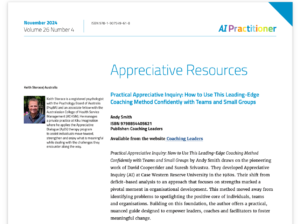Principles of Appreciative Inquiry in Coaching: the Enactment Principle

[ad_1]

“The only way to change the world is to live the difference” – Diana Whitney and Amanda Trosten-Bloom, The Power of Appreciative Inquiry
The Enactment Principle reminds us that the best way – perhaps the only way – to make your desired future come about is to start enacting it in the present. Acting ‘as if’ is crucial: the way to become braver is to act bravely. The way to become more compassionate is to act compassionately, even if you’re not feeling it.
What are we doing when we act ‘as if’? We are practising being how we want to be. The more we practice, the more it becomes true. As Aristotle says, “We are what we repeatedly do. Excellence, then, is not an act, but a habit.”
As well as building our skills, practising being the person we want to become by acting ‘as if’ strengthens our belief that we can get there. In the fine book Transforming Your Self, the personal development thought leader Steve Andreas points out that our belief that we are a particular kind of person is built on a ‘database’ of reference experiences of us being that kind of person.
Try this thought experiment:
- Think of a quality or skill that you know you have, and that you approve of.
- How do you know you have it?
Here’s what I think probably happened when you tried this. When you thought about how you know you have this quality or skill, you probably got some kind of image, or a sound, or a word or phrase, or a feeling, or maybe a combination of these, that confirms that you have it. When you thought a bit longer, you probably got a specific memory or two of occasions when you’ve shown that skill or quality. These reference experiences underpin your belief.
When we ask for stories of peak experiences in the Discovery stage of Appreciative Inquiry, we are reviving some of those reference experiences and making them more vivid in the client’s mind. And when they act ‘as if’ they are already the person they want to be, they’re creating more reference experiences that strengthen their belief and confidence.
Because our self-concept ‘database’ of reference experiences also acts as a guide for our future behaviour, every time we act like the person we want to become, we make it easier and more likely that we will act that way in the future. This is Robert Cialdini’s ‘Consistency Principle’ in action: taking a small action now means we begin to see ourselves as the type of person who acts in that way, and the more we see ourselves as that kind of person, the more we’ll act in that way.
This Consistency Principle also implies that the means we take to get there needs to be compatible with our end goal. If we intend to achieve a leadership position because we want to make the world a better place, it’s unlikely that achieving that position through political skulduggery would lead to success. Even if no-one else knows about the bad things we did to get there, our own ‘database’ of reference experiences for being a good leader would not give us confidence, nor act as a guide for good leadership, because it would be overwhelmed with counter-examples. The resulting cognitive dissonance would act as a drain on our energy, and probably lead to feelings of being a fraud.
By contrast, if our means to reach becoming a good leader are consistent with that goal, each step on the way becomes another reference experience to support our self-concept. Every action we take on the way makes us more of a good leader.
Is this all just ‘fake it till you make it’? Not at all. There’s no faking involved; instead, through your actions you’re calling into being the person you want to be. You could view it as taking the necessary steps to authentically become the person you are destined to be.
Some ideas for coaching questions prompted by the Enactment Principle:
- What will you be doing each day when you have achieved your Dream?
- What could you do now that will bring you closer to your Dream?
- On a scale of 0-10, where 0 is ‘not at all’ and 10 is ‘completely’, how consistent with your Dream are your chosen actions to get there?
[ad_2]




